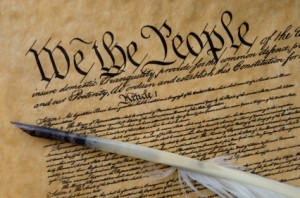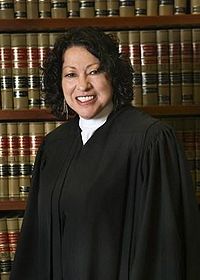*This is a repost of a prior facebook note.
I have been having a conversation with a few guys about gun control laws in the US. This has moved into a discussion of the proper reading of the Constitution. Because my current studies involve understanding the role of Interpretive Communities in finding the meaning of authoritative documents, that has come into the conversation as well. Below are some excerpts:

I think a discussion of gun control must include a discussion of the constitution. Let me be clear from the start – I believe the constitution is THE authoritative document concerning the rule and government of the United States. If something is truly unconstitutional, it should be squashed. I will resoundingly agree with those who say that “this document defines the USA”
Now comes the rub. Despite our agreement on the constitution’s authority, we all read the document differently. In fact, there isn’t a single correct way to read the constitution by which all other readings and readers must be held accountable. A perfect example of this is our Supreme Court, which has the authority (and I will quickly admit the constitutional source of this can certainly be debated) to interpret the Constitution in judicial cases. In the most important constitutional cases, the justices are often split. What does this teach us? Even the final authorities on constitution interpret it differently.
Let me a share a bit about myself. I am a pastor and have recently completed an MA in Biblical Studies. These discussions concerning the meaning and authority of documents are very near and dear to me. I spend most of my days working with documents many find to be authoritative, yet find different interpretations. Recently, I have begun a study on how Interpretive Communities affected the formation of scripture and consequently how that affects our reading of it. I am relying heavily on a literary theorist named Stanley Fish. It is at this point that our conversation must move from the political to the philosophical (namely the post-modern). Fish argues “meaning” and “truth” can only be grasped by the reader. He certainly affirms the importance of “authorial intent” but claims we will never be able to fully grasp that because we will always read a text through our own experience. Now critics often attack Fish for being too subjective – they say he is throwing out absolute truth by saying truth means different things based on the reader. He argues that a text cannot “mean anything” but instead must be found within certain parameters. Sometimes those parameters are tight, other times loose. In fact, he is quick to affirm those parameters change over time. For Fish (and for me as well), the source of those parameters, and thus the source of the constraints on possible meanings, are “Interpretive Communities.” Basically he argues we are a part of a shared community with shared experiences and worldviews. Being a part of those communities affects how we can read documents and find meaning. In fact, it is impossible to understand a text apart from our current context, our experiences and the Interpretive Communities to which we belong.
Here is a cheesy example. If I was in Kindergarten and we were reading a book that said, “we dropped the little boy on an island” because of the context and community I was a part of, the meaning would certainly be that a child was placed on some land surrounded by water. However, after I became a part of a community that understands WWII and the context of the nuclear age, I know the meaning of that could now be related to the dropping of an atomic bomb. Before my context / community changed, I could not possibly understand the other meaning – even if it was clearly talking about Hiroshima.
In discussion of the constitution, we see this happen when one court upholds one reading of the constitution, but later courts reject that view. What has happened? The interpretive community has changed.
I say that that, to say this. While I support the authority of the constitution, I do not necessarily agree with others reading of it. The second amendment reads:
A well regulated Militia, being necessary to the security of a free State, the right of the people to keep and bear Arms, shall not be infringed.
Grammatically (forget interpretively) this is a difficult sentence to understand. First, we could read this as one subject or as two. We can read this as a protection for both militias and the right to bear arms, or we can read it as simply a long sentence about protecting the militia wherein the right to bear arms is a part. Based on the syntax, this later definition makes more sense. After all, the second clause (being necessary…) clearly modifies the first. It would be fair to assume the third clause concerning the right of the people to keep and bear arms is simply describing the nature of a well regulated militia as well.
However, lets take the most popular reading and assume these are two rights being addressed together. Now we must ask what does it mean to have the right to bear arms? It does not say, “right to bear any arms,” it simply grants the right. So then if you own a .22 pistol, you are bearing an arm. As long as we allow some arms to be owned and do not flatly outlaw all arms, then one could argue the right is still being supplied. (By the way, I am not making this argument, just listing it). Now even if we reject this last argument and contend this amendment is protecting all arms, we must deal with the issue of infringement. It would be great to take a literalist argument and say NO LAW shall infringe in ANY WAY. But lets face it, that is not practical. To argue this takes us to absurd places. We find ourselves arguing for private citizens owning nuclear weapons and toddlers being able to carry concealed weapons.
 The fact of the matter is even a vast majority of gun owners support some limitations on types and contexts of arm bearing. Even those that argue the purpose of the second amendment was to ensure the people could be as well armed as the military do not want private ownership of nuclear weapons. If you make this absolute literalist argument and demand absolutely no infringement you must then argue it is perfectly acceptable for US citizen to be given a nuclear weapon by Iran. Lets try to stay away from the absurd. We must acknowledge a line must be drawn somewhere – our real question is where. Do we allow howitzers but outlaw a-bombs? Do we allow rocket launchers but outlaw howitzers? Do we outlaw rocket launchers but allow fully automatic machine guns? Do we outlaw fully automatic machine guns, but allow semi-automatic rifles? The list goes on. It is not a question of whether or not we limit the right to bear arms, but a question of where. Historically the authoritative readings of the constitution have allowed this line to be drawn and it requires a dance between the judicial branch and the legislative branch to find that spot.
The fact of the matter is even a vast majority of gun owners support some limitations on types and contexts of arm bearing. Even those that argue the purpose of the second amendment was to ensure the people could be as well armed as the military do not want private ownership of nuclear weapons. If you make this absolute literalist argument and demand absolutely no infringement you must then argue it is perfectly acceptable for US citizen to be given a nuclear weapon by Iran. Lets try to stay away from the absurd. We must acknowledge a line must be drawn somewhere – our real question is where. Do we allow howitzers but outlaw a-bombs? Do we allow rocket launchers but outlaw howitzers? Do we outlaw rocket launchers but allow fully automatic machine guns? Do we outlaw fully automatic machine guns, but allow semi-automatic rifles? The list goes on. It is not a question of whether or not we limit the right to bear arms, but a question of where. Historically the authoritative readings of the constitution have allowed this line to be drawn and it requires a dance between the judicial branch and the legislative branch to find that spot.
My friend made the following point concerning the intent of the second ammendment:
The second amendment allows citizens to have whatever armament the military has.
I think this is a great point, but unfortunately it is not backed by the constitution. Even if we could prove this was the intent of the framers (which is impossible to do) that does not make it the correct reading. You see, our constitution does not instruct us on how to read it. It does not state that the most correct reading is one that aligns itself with how the founding fathers viewed the world. I find most “constitutionalists” are not only arguing for the authority of the document, but also for a particular reading – in this case one that attempts to mimic the founding fathers. I don’t think this is a wrong reading, but there is no evidence this is the only correct reading. A person can be faithful to the letter of the law, without having to adopt the worldview of 18th century politicians. If our constitution included a section on how we are to interpret the document, then I would certainly honor that. However, this is an area that the constitution is silent on. One could assume the founders recognized that each generation would have to interpret it for that generation.
I want to be clear… I don’t think a reading that attempts to mimic the views of the founding fathers is wrong. However, I also don’t think that a person who reads the constitution faithfully through their own worldview and is following it the letter of the written law, is treading on our founding document (as people like Sean Hannity might argue). I firmly believe you can be faithful to the constitution without having to read it through the framework of the original authors. After all, any attempt to completely formulate authorial intent is subjective and incomplete at best.
To be honest with you, I have not formulated my own views on gun control and the second amendment. I am still trying to work through a proper approach to the issue. In discussions like these I think it is always best to find some common ground so we can avoid the extremes and discuss the implications of the particulars. For gun control discussion I think that means admitting there are legitimate reasons to own a wide variety of weapons (even those currently banned), most gun owners are responsible law-abiding citizens, criminals will still break the law, and that in all practicality, there must be some laws limiting the right to bear arms – even if we are only talking about nuclear weapons and toddlers with uzis.
Once those parameters are set, we can have a helpful conversation about where that line should be drawn without risking it descending into the absurd. We may not agree, but hopefully we can learn and genuinely discuss the positive and negative consequences of each law. I want to hear how a law is going to affect law abiding citizens as much as I want to hear the potential benefits. In order for that to happen, we have to be civil otherwise we simply pigeonhole each other and their arguments.
Thoughts?


